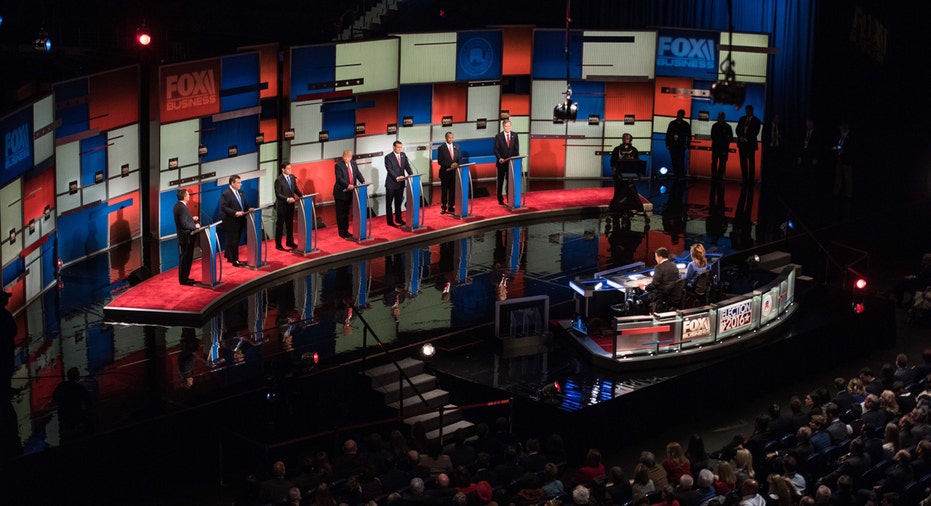Wall Street Missing in Action from GOP Race

The Democratic presidential candidates have demonized Wall Street, making reform of the sprawling and powerful U.S. financial sector a central theme in their battle for the nomination. Meanwhile, the GOP candidates have apparently been too busy insulting each other to articulate much of a vision for the future of U.S. banking.
Much of the Republican nomination process up to this point has focused on personal attacks between the candidates, with many of these skirmishes launched by front-runner Donald Trump, who’s running an unorthodox campaign to say the least.
So instead of a lucid discussion of whether so-called too big to fail banks should be broken up, or whether the banking reform regulations under the 2010 Dodd Frank legislation go far enough to rein in Wall Street risk taking, the public has been treated to a series of schoolyard shouting matches.
“I think it's fair to say the Republican candidates don't have much of a plan for Wall Street,” said Chicago-based securities attorney Andrew Stoltmann.
When the topic has come up during the GOP debates, the default response by several of the candidates has been to repeal Dodd Frank, the extensive array of new regulations imposed on the U.S. banking industry in the wake of the 2008 financial crisis.
Trump, Texas Senator Ted Cruz and Florida Senator Marco Rubio have said in no uncertain terms one of their first priorities as president would be to repeal the sprawling legislation. Other candidates – Jeb Bush and John Kasich, for example – have offered similarly pointed criticisms while not necessarily calling for its outright repeal. These candidates have said significant reforms to the legislation or rolling back aspects might suffice.
For the most part, the GOP response to Wall Street-related questions (when the topic comes up at all, which hasn’t been often) hasn’t focused on whether Wall Street needs to be fixed and how that might happen but rather on criticism of the Obama administration’s efforts at banking reform.
During Saturday’s GOP debate, the moderator pointed to a $3.2 billion settlement by Morgan Stanley (NYSE:MS) last week related to allegations the investment bank defrauded clients in the runup to the financial crisis. Retired surgeon Ben Carson, asked if he believed any Wall Street executives should have been held more accountable for their contributions to the crisis, responded by saying Wall Street is constrained by too many regulations.
“I think what we really need to do is start trimming the regulatory agencies, rather than going after the people who are trying to increase the economic viability of our society,” he said.
That’s not been the case in the Democratic race, where the subject of Wall Street’s influence has been hotly debated. Upstart candidate Vermont Senator and self-declared socialist Bernie Sanders, has based virtually his entire campaign on the premise that a very small slice of Americans (many of them Wall Street bankers) have corrupted the U.S. political system, advancing a dangerous economic inequality as the rich get richer and the poor get poorer.
Sanders’ message has resonated especially among young voters, forcing his presidential rival former Secretary of State Hillary Clinton to harden her rhetoric against Wall Street.
Stoltmann said the reason the GOP candidates have shied away from the issue is that most of them have received substantial campaign contributions from big Wall Street firms.
“Rubio and Cruz mostly have taken millions from banks and brokerage firms and are beholden to them,” Stoltmann said. “While Trump really hasn’t turned to the Wall Street cash spigot, he's nonetheless closely tied to the securities industry based off of extensive dealings with these firms for over 40 years.”
Consequently, “the Republicans candidates are highly susceptible to the accusations they are beholden to Wall Street. The public remembers what happened in 2008 and who is to blame,” he added.
Similar accusations have animated the Democratic debate, as Sanders has sharply criticized Clinton for accepting $675,000 in speaking fees from Goldman Sachs (NYSE:GS) and suggested she can’t be trusted to take a hardline against Wall Street after accepting so much money from them.
In any case, the Democrats have framed a much sharper image of what Wall Street reform would look like under a Sanders or Clinton administration. Sanders has said he would break up the so-called ‘too big to fail banks’ and reinstate a Depression-era law known as Glass Steagall that prevented big banks from gambling with their clients’ money. Clinton has said her reforms would extend further than Sanders by digging into the murky highly unregulated world of shadow banking populated by hedge fund gurus and high frequency traders.



















